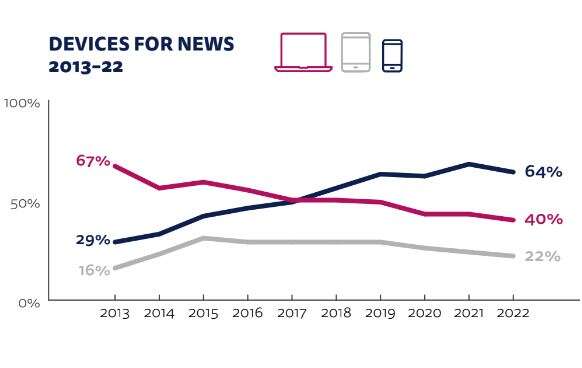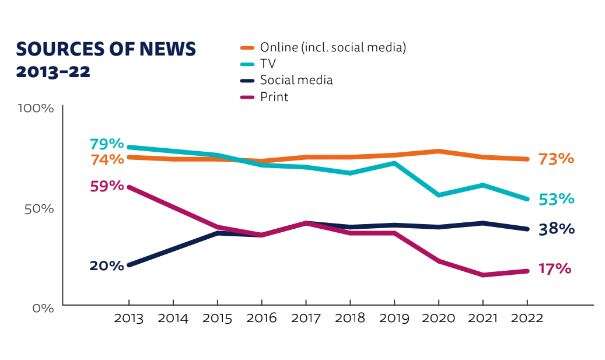
Smartphones are the first way for readers to access news in the UK followed by TV, radio and the print a distant fourth – according to the Reuters Digital News Report 2022.
Across all the countries surveyed, a majority of people reported using their smartphones to access news.
Some two-thirds (64%) of people in the UK and 56% in the US said they had used their phone to keep up to date.
In the UK this compared with 40% using their computer and 22% their smartphone.

The slight decline in the number of people accessing news through their phone was reflective of the wider fall in news consumption after the pandemic rather than a specific turn away from phone use.
Smartphones were also the most common way people got their news first thing in the morning, with younger news consumers even more likely to come across their first news stories of the day this way. Almost half (47%) of those under 35 said they typically first come across news each morning through their phone, compared with a quarter (28% ) of those aged 35 and older and just 15% of people aged 65 and older.
Habits however, varied across countries.
In the UK over a third (35%) of people got their first daily dose of news through their phones - up from 28% in 2019. TV came closest in the UK with 21% saying this was their go-to news source in the morning.
In Ireland smartphones, while the single most popular channel (used by 35% of people) were almost matched in popularity by radio (31%). In the Netherlands and Finland over one in ten people said that newspapers are an important part of their morning routine, much higher than many other markets.
In the UK, online remains by far the most popular source of news - cited by 73% of Reuters survey respondents, compared to print on 17%.
The UK survey results came from an online questionnaire distributed by Yougov with 2410 responses in February 2022.

Podcasts and newsletters remain focuses of publisher investment
After falling during the pandemic as commuting patterns were upended, podcasts are once again gaining in popularity and many publishers have invested significantly in the format which has done well with younger listeners.
"You can go on to the podcast section of Spotify, and they will tell you information about what’s going on that day – [for example] loud explosions have been heard in Kharkiv, Ukraine. It’s making information accessible to those that maybe would prefer not to read a lengthy article,” said one person interviewed for the report.
Across 20 countries, the report found that an average of 34% of people had listened to at least one podcast in the last month, up 3 percentage points from 2021. Twelve percent of people said they had listened to news podcasts in particular.
More people in Ireland accessed a podcast in the last month (46%) than in any of the 20 countries, followed by Sweden (44%). In the UK 25% of people had listened to a podcast in the last month. While this was fewer than in other established news markets, it was a 3 percentage point gain compared to 2021.
The podcast platform mix is also changing. Once dominated by Apple, in recent years Spotify, Amazon, and Google have upped their investment in podcasts. Spotify overtook BBC Sounds as the most popular podcast platform in the UK (with 30% of people regularly using it compared to 27% for BBC Sounds). The Swedish company was also the main podcast platform in Germany.
However as big tech platforms invest in content and are helping to grow audiences, a question remains about who will benefit from monetisation and data collection. As a result some publishers such as The New York Times have launched their own audio apps.
While podcasts are drawing in younger audiences, some publishers are also investing in newsletters which are especially popular among older, better-off news consumers. Nearly one fifth of people (17%) said they opened a newsletter weekly.
While newsletters are a "minority activity", said the report, their value to some users and some news organisations has grown. The New York Times' portfolio of 50 newsletters reach some 15 million people a week.
Newsletters were less popular in the UK where nine percent of people said they read a newsletter each week.
While the report fond that online and social consumption has grown, this was not significant enough to offset the decline in traditional media. Ten years of data since the first Digital News report have shown that the decline in print, radio and TV has been "consistent and relentless".
Press Gazette is hosting the Future of Media Technology Conference. For more information, visit NSMG.live
Email pged@pressgazette.co.uk to point out mistakes, provide story tips or send in a letter for publication on our "Letters Page" blog
